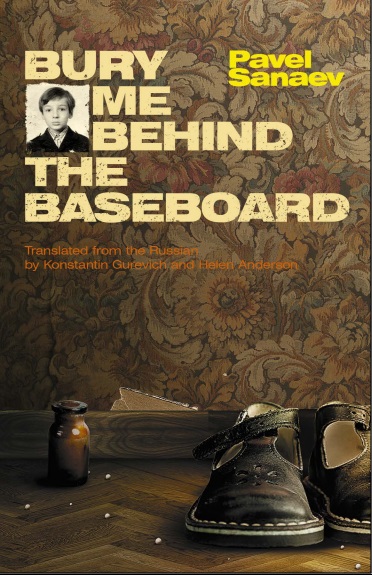Translated from its original Russian, Pavel Sanaev’s novel BURY ME BEHIND THE BASEBOARD is the tragicomic story of a young boy named Sasha, who lives with his abusive, mentally ill grandmother and meek, enabling grandfather in Soviet Russia. Each chapter is a stand-alone story describing a scene in Sasha’s young life, from a brief trip to a culture park with his grandmother to a month-long stay in a sanatorium for children. The chapters are connected by Sasha’s precocious attitude and his developing relationship with his complicated grandmother. Because the book is told from Sasha’s first-person perspective, he seems like an otherwise normal boy who wants to have fun with his friends and succeed in school. It’s only through his grandmother’s harsh dialogue, often in the form of feisty monologues, and her paranoid behaviors, that Sasha’s health comes into question. He both trusts her and fears her, wholeheartedly believing her when she says he must wear handkerchiefs under his clothes while he sleeps to absorb his sweat and that he must maintain a strict diet of boiled fish to stave off infection. Through his eyes, she is an honest and intelligent figure, though her occasional nervous breakdowns are evidence that her paranoid beliefs about his health may in fact be delusions. While Sasha takes to heart his grandmother’s constant stream of brutal words, believing himself a weak, sickly, moronic idiot, he doesn’t let them stop him from attempting to enjoy his youth.
Both Sasha’s joy and his melancholy are palpable throughout the book. His typical eight-year-old boy antics, such as entering abandoned properties with a friend and playing games like cops and robbers, are brazenly funny. Minute details portray the setting and characters’ actions with tangible imagery, showing goofy little observations that only children usually notice. In a similar manner, Sasha observes his grandparents’ and other adults’ unconscious behaviors, like his grandfather’s half-hearted attempts to cheer up his grandmother, only to give up easily and lock himself in his room; while Sasha just acknowledges the details in passing, focused instead on his daily imaginative play, these minor details speak volumes in terms of making his world feel vast and real, beyond the blinders of his youthful perspective. Sasha’s aching sadness is most poignant when he admits to asserting that he will beat cyclists in a race in the hopes that his grandmother will say “Of course you will,” only to be met with “You?! Just look at yourself!” Childlike fantasies of revenge sustain him through trouble with his peers, but his grandmother is never the subject of his desired vengeance. His near-blind trust, through the eyes of an aware adult reader, is more tragic than comic, diminishing some of the book’s attempts at humor. It is clear that she loves him but that her obsessive love manifests itself in delusions that are more harmful than helpful. Her fate at the book’s end is emotionally complex for both Sasha and the reader.
Pavel Sanaev’s BURY ME BEHIND THE BASEBOARD succeeds in showing the vast imagination and funny observations of children with writing that is both eloquent and detailed, but the main character’s blind trust of his abusive grandmother is more tragic than comic.
~Aimee Jodoin for IndieReader

